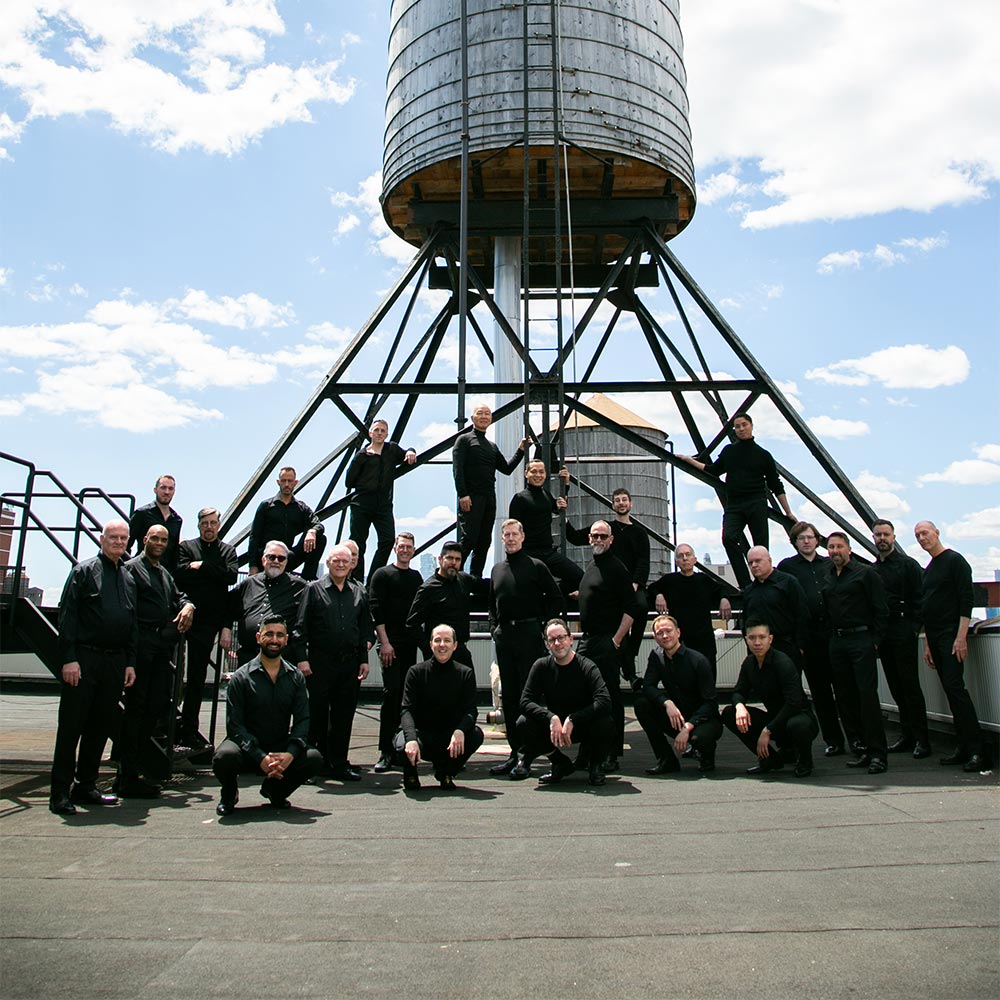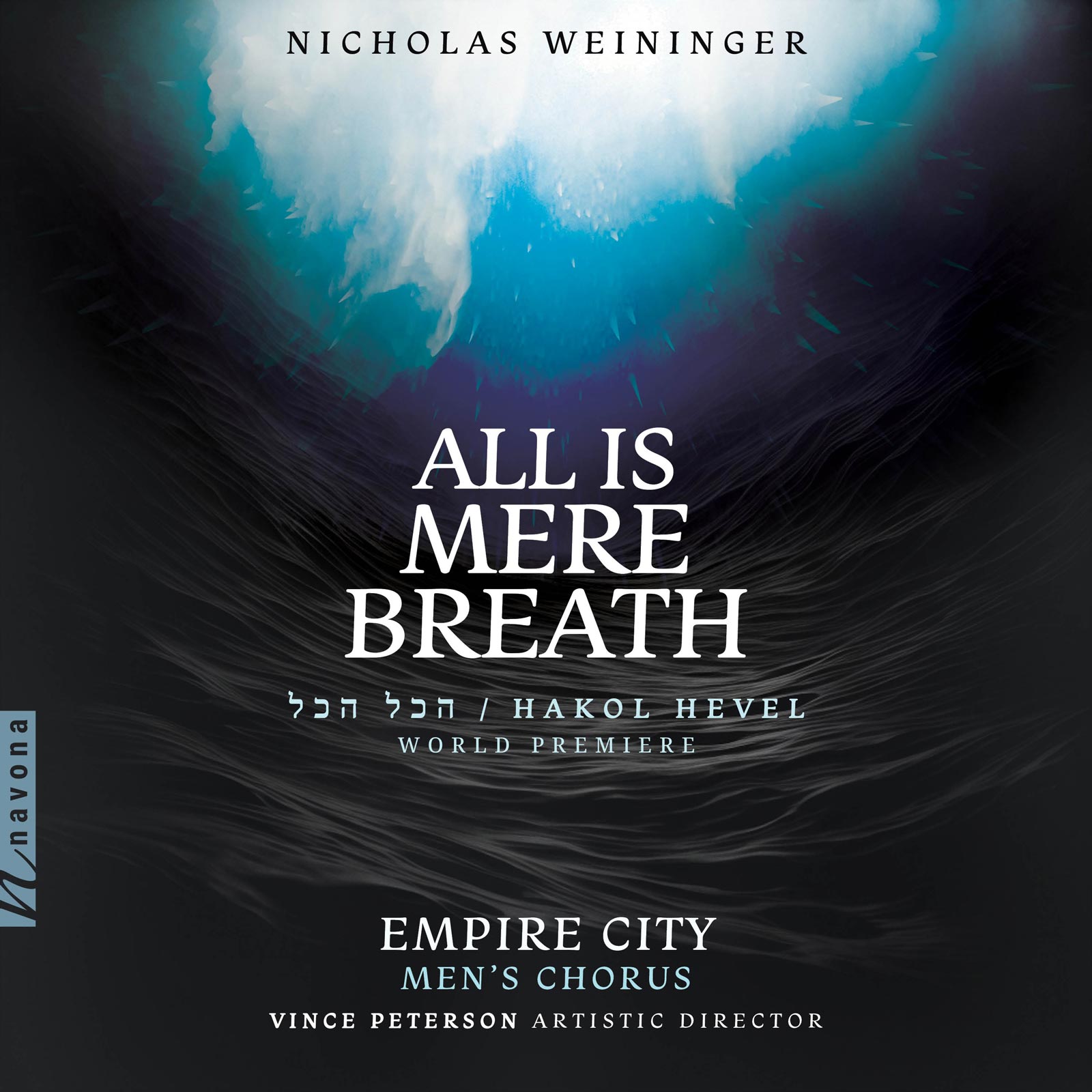
In the throes of lockdown, Nicholas Weininger found himself reflecting on this Hebrew verse; what is the nature of our collective life sustained on if not breath and breath alone? It was a breath robbed and convoluted during the COVID-19 pandemic: the ravaged breath of the afflicted, the fear of coming too close to the breath of another. Our world seemed to pause and take a breath, busy city streets gone barren amid our collective anxieties.
Debuted and recorded by the Empire City Men’s Chorus, ALL IS MERE BREATH asks us to question the nature of our changed society in the thought of mere breath alone, and offers us refuge in the breath of song, perhaps, now and then, the purest form of it.
Today, ECMC’s Marketing Chair on the Board of Directors David Ward (DW) and several featured performers are our guests on “The Inside Story,” a blog series exploring the inner workings and personalities of our composers and performers. Read on for sound musical advice from David, and how this release resonates with members of the ensemble…
What musical mentor had the greatest impact on your artistic journey? Is there any wisdom they’ve imparted onto you that still resonates today?
DW: Having spent my life as an opera singer and opera director, it surprises me that several of my most important musical mentors are my choral conductors. My high school choir conductor Buddy Ajalat introduced me to madrigals and disciplined choral singing, my college conductor Jack Russell inspired the Wooster Chorus to a level of excellence and musical expression that I carry to this day, and now Vince Peterson with Empire City Men’s Chorus. Their breadth of knowledge, their love of choral singing, and the resulting community they engendered is a gift that has resonated my entire life. If all is mere breath and singing doesn’t exist without the breath, then for me, all is mere singing, singing in community.
What were your first musical experiences?
DW: Choral singing, opera, and musical theater have been a constant in my life. My first musical experiences were singing around the piano with my Dad playing. He is an accomplished pianist and our favorite thing to sing through was Amahl and the Night Visitors by Menotti. I loved being a boy soprano and would sing the Amahl parts, when I got bored I would sing the shepherd’s pipe obligato part. My first choir was my church’s Junior Choir. My family still sings one of those songs every Christmas: Knock, Knock, Knock about Mary and Joseph in Bethlehem. As a kid I also sang the Third Spirit in The Magic Flute for the Bronx Opera. I learned the Queen of Night arias because I could hit all the notes! My first opera at the MET was Madama Butterfly and my first Broadway play was A Midsummer Night’s Dream with the Royal Shakespeare Company and I would one day play Bottom and Peter Quince. All this before I was 13!
What advice would you give to your younger self if given the chance?
DW: Listen to everything and broaden your musical tastes. I did not come to love early Music and the Baroque until my 30’s and now I listen to it a great deal. Listen to more contemporary music and learn to accept and appreciate its complexities. Having sung in several world premieres, all of which I greatly enjoyed, I wish I had sung in more of them. Study Italian! It will save you countless hours in the future.
Take us on a walk through your musical library. What record gets the most plays? Are there any “deep cuts” that you particularly enjoy?
DW: In addition to a massive number of complete opera recordings and original Broadway cast recordings, I love Italian pop music — including the oldies. I grew up in the disco era so I have a lot of that. In the “old days” we had record stores, remember Tower Records?, and I would walk out with armloads of recordings. My very first album was Bette Midler’s The Divine Miss M, quickly followed by Stevie Wonder, Gladys Knight and the Pips, and Rod Stewart. I was also gifted Gilbert & Sullivan’s Greatest Hits and Ten Great Arias by Ten Great Sopranos. My fate was sealed. Broadway shows get the most plays, and the disco and pop divas. A current favorite is Akhenaten by Glass in the thrilling Metropolitan Opera recording. Leontyne Price, Joan Sutherland, Montserrat Caballe, and Maria Callas are frequently played as is my favorite opera Dialogues of the Carmelites by Poulenc. The story of these nuns who sacrificed their lives for their faith speaks to my very core. Deep cuts I enjoy include the second act of Dialogues, the final movement of the Fauré Requiem, Leontyne in anything, and the fourth act of Verdi’s Don Carlo in the Giulini recording. It is the most incredible cast and there is no finer than Shirley Verrett’s Princess Eboli.
What emotions do you hope listeners will experience after hearing your work?
DW: All is Mere Breath will induce feelings of regret and sorrow about how the entire world was affected by the pandemic. Each of us was touched by it in similar but different ways. I lost friends to COVID-19 and I had to retire from my career in opera because the music world suffered such challenges. I have many friends who left the business because we just couldn’t make a living anymore. However, in the final portion of All is Mere Breath we sing the Oseh Shalom — a statement of hope. Humanity emerges back into the light and we realize that hope has not died. Finding Empire City Men’s Chorus was the incarnation of that hope for me. I thought my musical life was over but finding the chorus and joining these talented fellows reminded me that music never dies, but rather it uplifts. The joy I found in singing with this chorus and the joy our audiences experienced at our first concert restored balance back to my life. I believe that music can heal a broken world, and our chorus is part of that healing.
How does the music on ALL IS MERE BREATH resonate with you personally?
ECMC Principal Pianist Hee Sung Kim (HSK), Treasurer Craig Goodwin-Ortiz de Leon (CG), and member Steve Ostrow (SO) offered us their thoughts.
HSK: It is well known that the performing arts was one of the hardest hit industries during the pandemic. There was, of course, the obvious loss of income, which upended the livelihoods of many professional musicians. But what was more devastating was the complete dissolution of all outlets for their art form.
In desperation, we tried to find alternate means from the confines of our homes, joining virtual choirs and taking on other virtual projects. But despite all our best efforts to learn new technology and adapt, there was a huge void that just could not be filled. And I think the reason for that was the absence of breath.
I believe the essence of music is breath. That breath is palpable in the sounds and silences of a piece of music. Furthermore, as musicians, our dedication is to communicating the depths of our souls with each other and with our audiences. And that communication can only happen when we are physically feeling and sensing each others’ breaths. In my native Korean language, we refer to collaborative music making as “matching breaths.”
Ironically, it was also this very breath that killed millions.
In Hakol Hevel, (All Is Mere Breath), Nick Weininger takes us on a beautiful, profound journey; through the turmoil, the despair, the desperation, the defeat, and finally, a sense of hope. This piece had an indelible impact on us all. Our hearts and souls were filled with gratitude and joy as we finally joined together in person to share this breath of life.
CG: Taking a breath is the first thing we do and the last thing we do. In between those two breaths are many more, filled with love, joy, sorrow, pain, and much more. When my mother took her last breath in October 2021, her lungs had been severely damaged by COVID-19 pneumonia. It was very difficult to express the emotions I experienced during my mother’s battle with COVID-19 and in the aftermath of her death.
I had been singing with Empire City Men’s Chorus for nine years in 2022, when it was announced that we would perform Hakol Hevel, a choral piece dedicated to the victims of COVID-19. The experience of learning, preparing, and performing this incredible work served as a vehicle to express the emotions I had felt in the best way I know how — through music. I was able to express the feelings of helplessness while my mother was in the hospital alone, with no visitors allowed, with the disease progressing and taking her breath of life away. Nicholas Weininger wisely wrote music to the words “My God, my God, why have you forsaken me?”
The feeling that God had forsaken us was real. Weininger’s work has given me the sense of closure I needed to complete the mourning process. This powerful work warns us to learn from these experiences and to not take our breath for granted.
SO: When Empire City Men’s Chorus began rehearsing All is Mere Breath I became a bit anxious because it reminded me of the first year of the pandemic, when several of my hospital colleagues died from COVID-19. When I recognized that the final movement is a portion of the Kaddish, my anxiety lessened because of its role in Jewish prayer.
Kaddish is not meant to be recited by an individual alone. Traditionally it’s recited by a quorum of at least ten Jews praying together. My brothers and I recited Kaddish in synagogue after the death of each of our parents, and when you recite it in that setting it allows you not only to focus on memories of your loved one who’s passed away; because the non-mourners present always join in the recitation, it also strengthens your bonds with the congregation. I consider ECMC to be another form of congregation in which we members are dedicated to making music together. I think it’s very appropriate that the final movement of All is Mere Breath is this beautiful setting of a portion of the Kaddish. Singing it with my brothers in music strengthens my bond with them even as I reflect on the difficult times we’ve come through together.

Now celebrating 30 years, Empire City Men's Chorus (ECMC) has resounded with the heartbeat of humanity, transcending the realm of a traditional choral ensemble to become a transformative movement. From its founding in 1993 as The Gay Gotham Chorus, ECMC has remained dedicated to giving back to the LGBTQ community, initially supporting AIDS-related healthcare services and evolving to fearlessly confront the pressing challenges of New York City’s at-risk individuals, making a resounding impact in the greater community.

